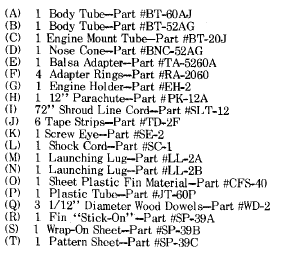Estes Semi-Scale Saturn V
Estes - Semi-Scale Saturn V {Kit} (1239, K-39) [1969-1979]
Contributed by Jeff Lane
| Construction Rating: | starstarstarstarstar_border |
| Flight Rating: | starstarstarstarstar |
| Overall Rating: | starstarstarstarstar_border |
| Manufacturer: | Estes  |

Brief:
The Estes Semi-Scale Saturn V is a highly desirable vintage collectible that sells for hundreds of dollars on eBay
and is very rarely seen in its original packaging. It's a simple BT-60 rocket with an ingenious fin can that is a very
reliable flier on Estes black powder 18mm motors.
Construction:
The build starts with the standard cardstock centering rings/coupler assembly, BT-20, and motor hook. What's not
standard is the plastic coupler, to which the fins eventually glue.
At the nose, the BT60-to-BT52 adapter is balsa and is glued to the upper body tube, which is a BT-52. The upper adapter/nose cone/tower is all one piece of balsa and is glued into the other end of the BT-52. The tower nose cone is cut off and a launch lug is then glued in place to form the tower tank.
The fin can is a great design. First you build the paper engine shrouds. The motor mount coupler is plastic and you cut slots in the body tube. The short-tabbed oversized clear plastic stabilizing fins glue through the body to the coupler. This avoids the dreaded plastic-to-paper gluing joint and provides an extremely durable joint.
 Finishing:
Finishing:
The instructions suggest painting after the printed paper wraps are applied, but the best way is to mask off the
wrapped areas, primer and sand to remove spirals, and then glue the wraps on the bare paper.
There are small paper facade fins that glue to the clear plastic fins. The systems tunnels are small diameter hardwood dowels.
Finally, there is a four-sided printed paper piece with a little paper adapter that represents the tower scaffold. The escape tower broke off long ago, but not to worry, my little astronauts don't really need it.
Construction Rating: 4 out of 5
Flight and Recovery:
The model in the photo has been flown so many times (I estimate 30) that several components have been replaced. The
original cardstock centering rings on the engine mount were first to go and have been replaced by balsa. The clear
plastic fins have been replaced with 1mm thick mylar. Of course, the standard folded paper shock cord mount, shock
cord, and 12” parachute have been replaced several times.
Recommended motors are A8-3, B6-4, and C6-5. I have flown on B6-4s and C6-5s. Deployment always occurs very close to apogee. The rocket flies straight and gains impressive altitude on a C. I may someday fly it on a composite D.
Flight Rating: 5 out of 5
Summary:
The kit always incites murderous envy among the old guys when I trot it out, but the kids don't even see it.
Overall Rating: 4 out of 5
 |
 |
Flights
Sponsored Ads
 |
 |











